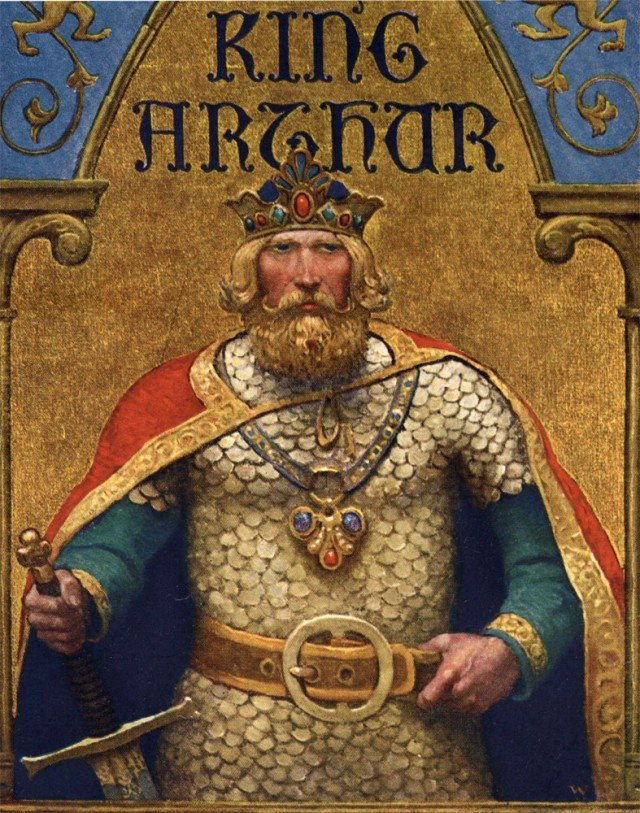King Arthur - Biography

King Arthur, the mythological figure associated with Camelot, may have been based on a 5th to 6th century British warrior who staved off invading Saxons.
IN THESE GROUPS
- FAMOUS PEOPLE NAMED ARTHUR
- FAMOUS PEOPLE WHO DIED IN UNITED KINGDOM
- FAMOUS BRITISH MILITARY LEADERS
- FAMOUS KINGS
Show All Groups
Synopsis
King Arthur is a medieval, mythological figure who was the head of the kingdom Camelot and the Knights of the Round Table. It is not known if there was a real Arthur, though it is believed he may have been a Roman-affiliated military leader who successfully staved off a Saxon invasion during the 5th to 6th centuries. His legend has been popularized by many writers, including Geoffrey of Monmouth.
A Historical Mystery
Little is known about the possible figure who inspired the story of King Arthur, a heroic monarch who has been a popular mythological and literary character for some time. It has been suggested that the real-life "Arthur" may have been a warrior/officer of Roman affiliation who led a British military force against incoming Saxon forces during the 5th to 6th centuries A.D. Still, Celtic monk Gildas wrote of the Saxon invasion in his work The Ruin and Conquest of Britain, citing the conflict at Badon Hills, and no warrior named Arthur is mentioned.In contrast, the 6th century bard Aneirin crafted the Welsh collection of poems The Gododdin in which a heroic Arthur is spoken of. Yet with the work originally shared orally as opposed to being written down, it is impossible to ascertain if Arthur was part of the original story. Another poet, Teliesin, mentions a valiant Arthur in his work as well.There has also been another suggestion circulated that references to Arthur were actually a way of honoring via myth a Celtic bear deity with a similar name.
Becomes Heroic Figure
During the 800s, Nennius of Wales wrote History of the Britons, which became a core Arthurian text in that it listed a dozen battles in which the warrior fought, though it would have been logistically impossible for him to have done so. Nonetheless, Nennius's work positions Arthur as a valiant, praiseworthy persona; this was later expounded upon in the 12th century Latin writings of Geoffrey of Monmouth, who told the story of the mystical figure of Merlin and joined his life with that of Arthur's, also giving the king/warrior a birth story and an overall trajectory in widely-read text. Due to cultural intermingling in Europe, political influences and writers' imagination, the Arthurian story developed into a full-fledged legend and complex story, with an emphasis on a noble kingdom called Camelot, the Knights of the Round Table and the queen, Guinevere, who has an affair with the knight Lancelot. Other aspects of the tale include the king's deadly conflict with his nephew or son, Mordred, and the knights' quest for the Holy Grail.
Arthur in Literature...
Thomas Malory was the first to provide an English prose retelling of the legend in his Le Morte D'Arthur, published in 1485. Centuries later, Alfred Tennysonpublished his Idylls of the King throughout the latter half of the 1800s, telling the story of Camelot in the form of an epic poem.The story of Arthur has continued to be interpreted by a variety of writers, including children's authors, comic-book scribes and novelists such as Marion Zimmer Bradley, whose Mists of Avalon (1982) looks at the legend from the female characters' perspectives.
...And on the Screen
In the 20th century, King Arthur also found his way to stage and screen. During the '60s, the myth found a home on Broadway with the musical Camelot, which starred Richard Burton as Arthur. Later revivals would see Richard Harris—who starred in the 1967 movie version as well—and Robert Goulet portray the monarch. A more serious, grim take on Camelot was seen in the 1981 film Excalibur, with Helen Mirren in the role of Morgana, half-sister to the king. Fast forward to the next millennium where Antoine Fuqua directed King Arthur (2004), whose still fantastic plot relied more heavily on the idea that Arthur, here portrayed by Clive Owen, was a military leader against the Saxons.Aiming to properly contextualize the array of tales presented, documentarian and writer Michael Wood has looked at the cultural and geographic origins of the King Arthur story in his PBS series In Search of Myths and Heroes.
Hi! I am a robot. I just upvoted you! I found similar content that readers might be interested in:
https://www.biography.com/people/king-arthur-9190042#!
Great write up & interesting read, thanks for posting
ohh great
nice post
nice
nice post
Good Post
nice one :D
nice one
nice post